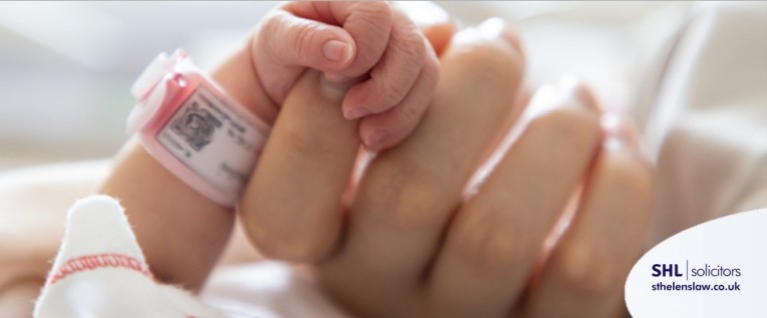But don’t be deterred.
Giving birth always carries a risk. But here in the UK, there are certain legal standards the doctors and midwives should follow to help minimise those risks – giving mother and baby the best possible chance of leaving the hospital happy and healthy.
Unfortunately, however, those standards aren’t always upheld.
Over the last 10+ years, staff at East Kent Hospitals University NHS Foundation Trust were found to have failed catastrophically in this duty – leading to devastating (and in some cases, even fatal) consequences for the families affected.
The high-profile inquiry discovered that out of the 202 cases examined, up to 45 babies may have survived, 12 babies may not have suffered a brain injury and 23 women who died may have had a different outcome – if only they’d received nationally-recognised standards of care.
And the sad truth?
Some of these families are still awaiting the outcome of their maternity negligence claims, and are yet to receive the moral justice and financial compensation they’re owed.
A question of liability
The report into maternity services at East Kent Hospitals was cut and dried.
Headed by Chairman Dr Bill Kirkup, each case was examined in detail, and it was found that gross failures of the maternity team had led to ‘avoidable deaths and injuries’. What’s more, the trust gave the appearance of ‘covering up the scale and systemic nature’ of its problems.
But it seems such damning conclusions aren’t enough for NHS Resolution.
Whilst the inquiry’s investigation panel weren’t in a position to rule on medical negligence, they did provide a robust clinical assessment of each case. Which Kirkup hoped would be ‘taken into account in deciding to offer early settlement instead of a protracted dispute’.
However, despite everything, NHS Resolution have stated that families will need to prove liability for the harm caused before receiving any compensation – by recruiting medical negligence solicitors, undergoing physical and psychological assessments and gathering evidence from obstetric, midwifery and neonatology experts.
Several cases have been resolved, but many other families are still going through the process of claiming – and, for these people, the end is nowhere in sight.
How to prove medical negligence
Considering the circumstances and the findings of the inquiry, it was hoped a more compassionate approach would have been taken for these families. But that hasn’t been the case, and the usual process for NHS negligence claims will have to be followed.
An NHS Resolution spokesperson said this will involve ‘reviewing the evidence on each case, including inquiry findings, to determine whether the care was negligent and caused harm’.
Fair or unfair? That’s open for debate.
But what can be agreed, is that proving liability can feel very daunting. For anyone in this position, about to bring a claim for maternity negligence – or any other form of medical negligence – here we explore what’s needed to prove the relevant standards weren’t upheld.
What evidence will you need?
To give your medical negligence claim the best chance of success, typically, your legal representative will gather three key types of evidence:
1. Medical evidence
Evidence taken from your medical records can be instrumental in proving responsibility.
Analysed by your solicitor and an independent medical expert, they can be used to demonstrate the substandard level of care received – and how this led to avoidable harm or injury.
You’re also likely to be asked to attend a medical examination. This is to determine the extent and severity of your injuries and their impact on your life – now and in the future.
2. Statements
Firstly, your solicitor may ask you to provide a personal statement. This should be as accurate as possible, and will need to include details of each stage of your treatment, where you think staff failed in their duty of care and how the injury has affected your daily life.
A number of additional witness statements may also be requested.
These could be from healthcare professionals, carers, people present at the time of the negligent care (especially if there were times at which your consciousness was impaired) and family and friends who have seen the physical and psychological impact of your injury.
By building a complete picture, such accounts can help to support your claim.
3. Financial evidence
Once your solicitor reaches the point of calculating a settlement figure, evidence is required to prove any expenses that have arisen from your injury. For example, this could include payslips and bank statements to prove your lack of income, invoices for any medical treatment or rehabilitation services, receipts for travel to hospital appointments etc.
Is it difficult to prove medical negligence?
This depends on the individual circumstances and the evidence that you can collect.
You need to prove that the care received fell below a reasonable standard. What is a reasonable standard can be made known by seeking an opinion from another expert in that field. You have to show that the fall in standard caused you to suffer harm. And to do this, the evidence collated will need to show that:
- The medical professional/establishment had a duty of care towards you or the patient
- This duty of care was breached
- That breach caused you or the patient in question harm (known as causation)
One thing is for certain though…proving medical negligence is much easier with the help of a medical negligence solicitor.
Thanks to their specialist knowledge in this complex area of the law, a solicitor is ideally placed to advise on your eligibility to claim and guide you through the process. Plus, they can request medical records on your behalf and typically have access to a network of medical experts – allowing them to gather the necessary evidence to support your case.

Contact our medical negligence solicitors
Think you may have grounds to make a maternity or birth injury claim?
Or maybe you’ve fallen victim to another form of medical or clinical negligence?
Please don’t be discouraged by the thought of having to prove liability.
It’s important to seek your rightful compensation for any pain, suffering or losses you’ve experienced. And with the insight and support of our medical negligence solicitors on your side, the process of making a NHS medical negligence claim – and, importantly, collating evidence – is usually pretty straightforward.
Here at St Helens Law, we have experience in claims relating to maternity and birth injuries, as well as negligence issues across a wide range of other medical and clinical sectors. So whatever the nature of your experience, or the severity of your injury, it’s worth reaching out.
We’re here to help and can take care of all the legal aspects of your claim, from gathering the evidence and arranging medical examinations to calculating a fair level of compensation and negotiating with the defendant. Leaving you to focus on your recovery.
To request a free initial consultation, simply fill out the form at the top of this page. Or, if you have any questions – about medical negligence claims, how to prove medical negligence, how we can support you etc. – please don’t hesitate to get in touch. Either call us on 01744 742360 or send an email to info@sthelenslaw.co.uk.


